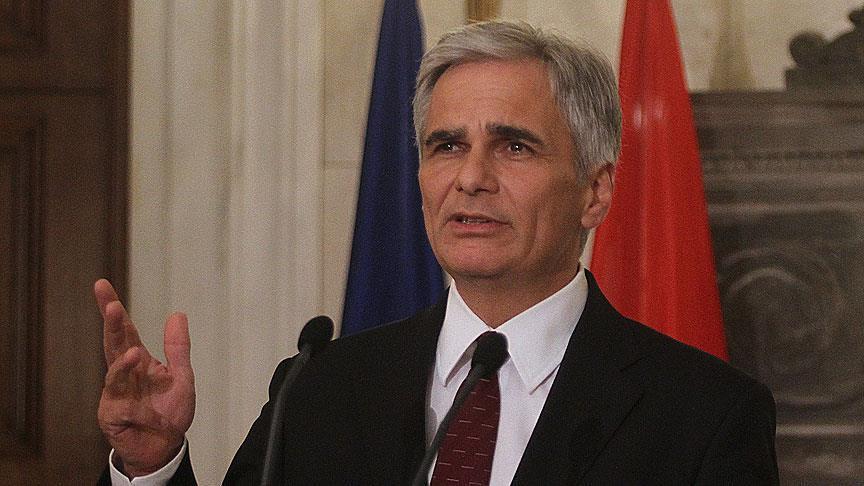 ( Hasan Tosun - Anadolu Agency )
( Hasan Tosun - Anadolu Agency )
By Hasan Tosun
VIENNA
The schism inside Austria’s ruling Social Democrats (SPO) that led to the resignation of Chancellor Werner Faymann was triggered by the refugee crisis gripping Europe, political analysts said Tuesday.
Faymann stood down as chancellor and party president on Monday after nearly eight years in office.
Hakan Akbulut, a researcher at the Austria Institute for International Relations, said his U-turn on refugees led to opposition within the party, which was accentuated by the SPO’s dismal showing in last month’s presidential election, when Faymann failed to pass the first round.
“In the beginning, Faymann sided with German Chancellor Angela Merkel and welcomed the refugees into Austria but later he made a U-turn and joined the anti-refugee camp including Hungary and some other countries,” Akbulut told Anadolu Agency.
While his change of heart was welcomed by the party’s right-wing, the more progressive faction opposed the switch.
These divisions were further exacerbated after the April 24 election by argument over whether the party should form a coalition government with the far-right Freedom Party, which won more than a third of the vote.
This shift to the right made Faymann’s departure “inevitable”, Akbulut said.
“In case the new chairman adopts a pro-refugee policy, there will be problems with the coalition partner and a snap poll will be inevitable,” he added.
Calls to quit
Farid Hafez, of the University of Salzburg’s department of political science, said other social democratic parties in Europe were facing the same crisis.
He claimed the SPO’s had abandoned its traditional center-left ground, making the emergence of a new party of the left a likely outcome.
“Most members of the SPO have retired and a lot of young activists are not happy with the political leadership,” he said. “Therefore, the problem of the social democrats is not a new leader but a problem of keeping the party together. Whoever takes charge, it won’t be an easy job.”
Faymann had faced calls to quit following the SPO’s defeat in the first round of the presidential ballot.
The 56-year-old was also criticized for defending Austria’s open-door refugee policy before reversing his position in March and imposing a cap on asylum applications and erecting a fence along the border with Slovenia.
Austria has been run by a coalition government since December 2013, when the SPO joined the Austrian People's Party in forming an administration.
The Freedom Party victory is the first time a far-right party has received the largest share of the vote in modern Austrian history.
Its candidate Norbert Hofer got 36.4 percent of votes, followed by Green Party candidate Alexander Van der Bellen on 20.4 percent and independent Irmgard Griss on 18.5 percent.
Voters are to choose between Hofer and Bellen in the second round on May 22.
Anadolu Agency website contains only a portion of the news stories offered to subscribers in the AA News Broadcasting System (HAS), and in summarized form. Please contact us for subscription options.

